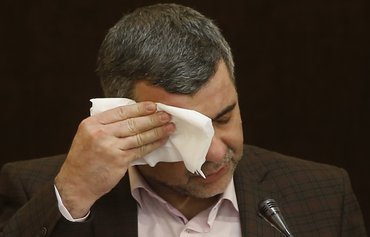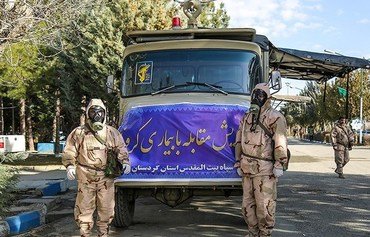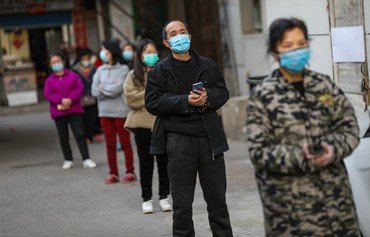Iran's concealment of information about the spread of the novel coronavirus (COVID-19) pandemic and its delay in taking precautionary measures stems from the policy of the Islamic Revolutionary Guard Corps (IRGC), experts said.
The IRGC's foremost goal is to protect its own interests, even though this policy has cost Iranian people their lives, they told Al-Mashareq.
It is not just the Iranian people who have paid with their lives for this policy, but also the citizens of other countries in the region where the IRGC and its affiliates have a presence.
The IRGC and affiliated militiamen travel back and forth between Iran and those countries without undergoing precautionary medical checks or procedures.
![Iranian authorities failed to take firm measures to stem the outbreak of the virus, as seen in this photo of a funeral attended by IRGC officers and elements. [Mehr News Agency]](/cnmi_am/images/2020/04/17/23515-iran-transparency-coronavirus-600_384.jpg)
Iranian authorities failed to take firm measures to stem the outbreak of the virus, as seen in this photo of a funeral attended by IRGC officers and elements. [Mehr News Agency]
"Transparency in disclosing figures related to the spread of the coronavirus pandemic, in terms of the extent of the spread, infection and deaths, is not an internal matter that concerns only one country and its people," said al-Sharq Centre for Regional and Strategic Studies researcher Sami Gheit.
It is "rather the entire region around that country, and the world at large", he told Al-Mashareq.
"The IRGC, on the other hand, concealed information about the pandemic's spread and failed to take the necessary precautions" to prevent its spread, he said.
"The Syrian regime is following the same pattern of shunning transparency," he added.
Suppression, crackdown on activists
The Iranian authorities committed "the most egregious crime against the Iranian people by neglecting to stop flights to and from China after the detection of the coronavirus outbreak in China", said Iranian dissident Hussein Shayan.
"In order to protect its interests with China, the IRGC spurned all global warnings" by continuing to allow flights to and from that country, he told Al-Mashareq.
"The warnings did not only come from abroad but also from the inside, as Iranian activists posted many videos showing that these flights were continuing," Shayan said.
In response to these protests, the Iranian regime suppressed those activists, he said, "which is what the authorities customarily do when condemning information about them and their actions against their people is published".
"In view of the continued pattern of non-transparency and exclusivity of decision making by the IRGC, the information published on the outbreaks and the infection and death toll figures are only fractions of the actual figures," he noted.
"Activists are circulating information and figures that are very high, many times higher than the figures announced so far," he said, adding that "the medical response measures are not commensurate with the threat".
A report published Tuesday (April 14th) by the Iranian parliament said the real death toll from Iran's outbreak was estimated to be as much as 80% more than that announced by the government.
The number of COVID-19 infections were estimated to be "eight to 10 times" higher, the parliament's research centre said in its report.
It said the officially announced figures were based only on "patients that are hospitalised with severe symptoms".
It also criticised the government for being slow to act against the outbreak and said a "second wave" of the virus may come next winter -- possibly without a break due to containment measures taking too long.
Similar rhetoric from IRGC, Hizbullah, Houthis
The policy pursued by the IRGC and its affiliates is based on projecting total control and creating the impression that conditions in areas under their influence are stable, and that any shortcoming, if found, is caused by external interference, said Ibn al-Waleed Studies and Field Research Centre director Mazen Zaki.
This rhetoric is replicated by the leaders of the Quds Force, Lebanon's Hizbullah and Yemen's Houthis (Ansarallah), he told Al-Mashareq.
Together, they all work towards one goal: to tighten their control over their areas of presence "in any way possible, whatever the price", he said.
So, it was natural "for the IRGC to conceal information about the spread of the coronavirus in Iran, because otherwise it would reflect negatively on it in areas where it has a presence", he said.
This would harm its popularity and lead to the failure of its expansionist project, Zaki added.
However, current information about the spread of the virus globally and the role that social networking sites are playing in the transmission of facts, have made it quite impossible to conceal the facts, Zaki said.
"This is why we see the IRGC and its affiliates clamping down on, intimidating, and even detaining" anyone who spreads information that goes against the regime's interests, he said.

![Patients suspected of infection with novel coronavirus wait their turn to receive care in a Tehran hospital hallway. [Mehr News Agency]](/cnmi_am/images/2020/04/17/23513-iran-transparency-coronavirus-600_384.jpg)






